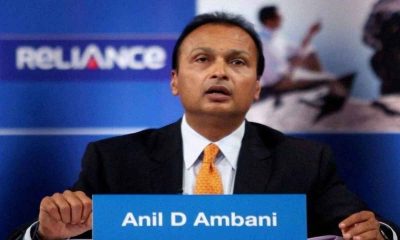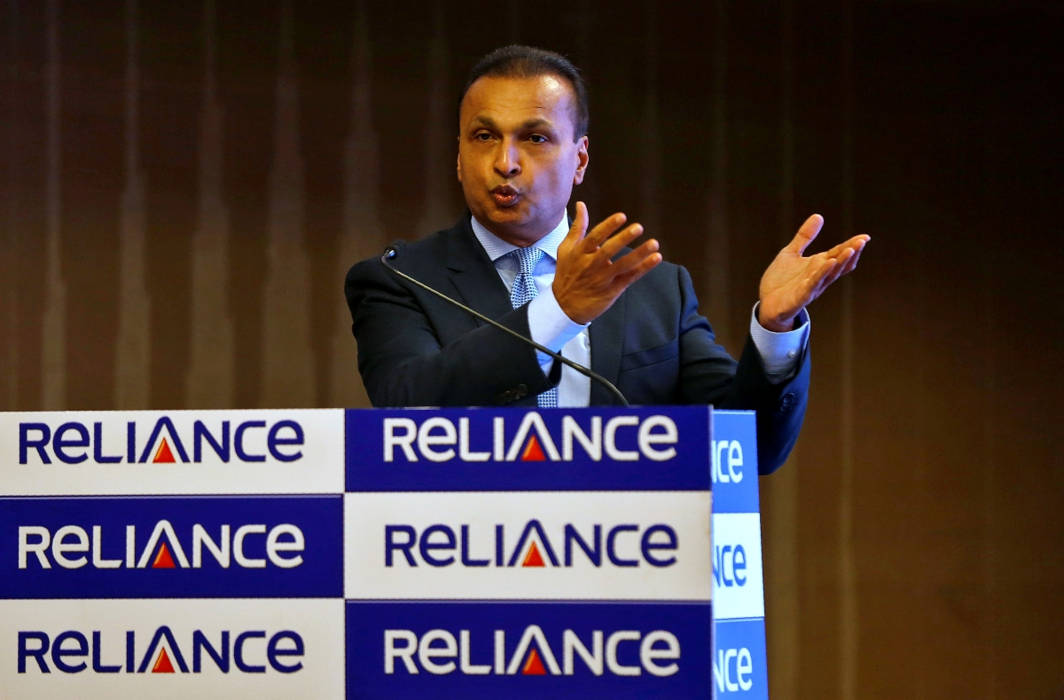Latest business news
Anil Ambani steps down as director of Reliance Power, Reliance Infrastructure
Reliance Group Chairman Anil Ambani resigned as director of Reliance Power and Reliance Infrastructure on Friday following a market regulator’s order barring him from associating with any listed firm.
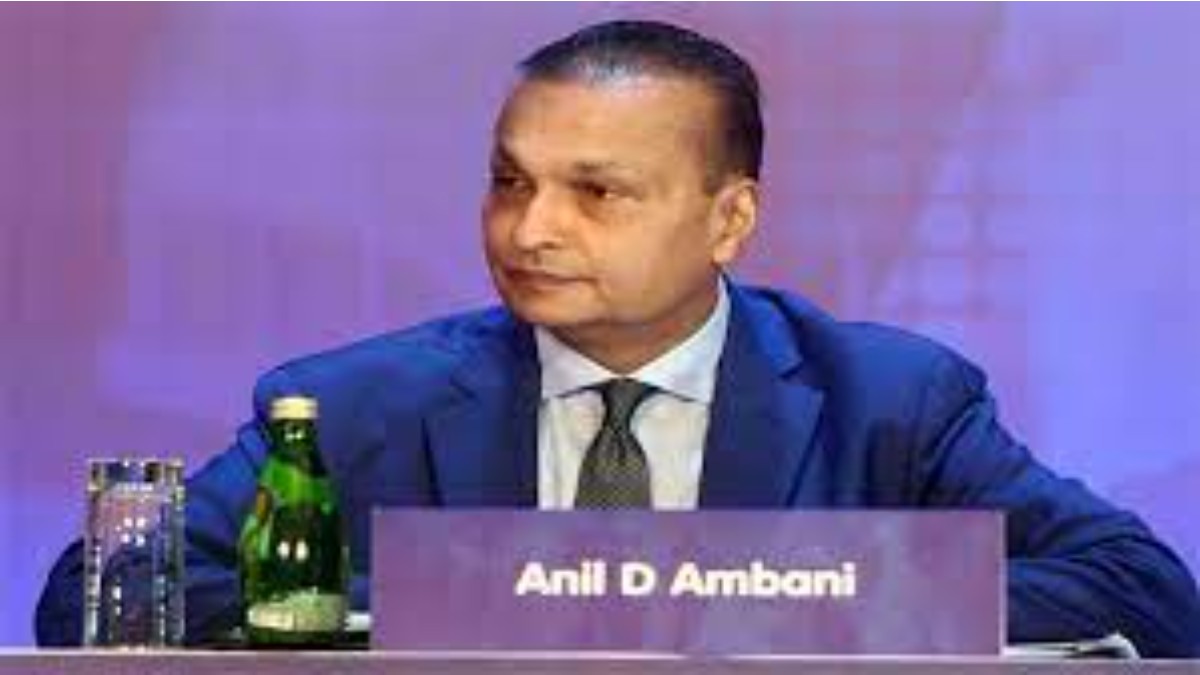
Reliance Group Chairman Anil Ambani resigned as director of Reliance Power and Reliance Infrastructure on Friday following a market regulator’s order barring him from associating with any listed firm.
In a BSE filing, Reliance Power said non-executive director Anil D Ambani steps down from the board of Reliance Power in line with SEBI (Securities and Exchange Board of India) interim order.
Reliance Home Finance Ltd, industrialist Anil Ambani, and three other individuals were suspended from the securities market by the Securities and Exchange Board of India (SEBI) in February for allegedly siphoning funds from the company.
Anil Ambani has stood down from Reliance Infrastructure’s board in line with SEBI’s interim order, according to a separate filing to the stock exchange.
Ambani and three others were also barred from associating themselves with any intermediary registered with SEBI, any listed public business, or acting directors/ promoters of any public company which plans to raise money from the public until further instructions, according to the regulator.
The company’s board of directors affirmatively reposed full trust in Ambani’s leadership and invaluable contribution to guiding the company through enormous financial hurdles and towards becoming potentially debt-free in the coming financial year, the company said. They also stated that the boards of directors are looking forward to a quick resolution of the situation and asking Ambani back to manage the company in the best interests of all stakeholders.
Rahul Sarin has been appointed as an Additional Director in the capacity of Independent Director on the boards of RPower and RInfra on Friday, subject to the approval of members at the general meeting, according to the two Reliance Group firms.
The company has created tremendous wealth for its approximately 8 lakh shareholders over the last year, with the stock price rising from a low of Rs 32 to a high of Rs 150 (469 percent), according to the boards.
Rahul Sarin, 72, retired as Secretary to the Government of India after a successful career in public service spanning more than 35 years. Sarin is currently a director at Afthonia Private Limited.
Arvind Kejriwal’s jibe on The Kashmir Files triggers meme fest on Twitter, Kejriwal exposed trends
Latest business news
Google restores delisted Indian apps after government intervention
Google on Saturday restored all Indian apps it had removed.

Google has started to restore all the delisted Indian mobile apps on Play Store agian, which they had removed due to a disagreement over service fees. After a discussion between company representatives and IT Minister Ashwini Vaishnaw, the decision was made, according to sources.
The step was taken in response to Vaishnaw’s strong statement in which he said that it is not allowed for apps to be removed from the Google Play Store. The minister had said, India is very clear, our policy is very clear…our startups will get the protection that they need.
Vaishnaw continued saying that he has already given Google a call. They will be speaking with the app developers who were delisted this week. This is not acceptable. The minister said this kind of delisting cannot be permitted.
Ten Indian companies’ apps were banned by Google on Friday, causing outrage in one of its fastest-growing markets. With 94% of phones running on its Android platform, Google holds a large portion of the Indian market. Popular names like Naukri and Bharatmatrimony were on the list.
The main point of contention is Google’s in-app purchase fees, which range from 11% to 26%. Indian startups have long opposed the US tech giant’s actions, believing them to be unfair.
The founder of Bharat Matrimony, Christian Matrimony, Muslim Matrimony, and Jodii, Matrimony.com, expressed shock at the matchmaking apps’ removal from the Google Play Store.
Shaadi. Com CEO Anupam Mittal described it as a dark day for India’s internet, highlighting the possible broad effects on matchmaking services. He also called Google an evil.
While, Kuku FM Co-founder Vinod Kumar Meena in a statement had said that Google was behaving like a monopoly.
Meanwhile, Google temporarily withdrew the famous Indian payments app Paytm from the Play Store in 2020, claiming a few policy infractions. Due to this decision, the founder of the company as well as the larger startup community came together to build their own app stores and file lawsuits against Google.
Latest business news
Anant Ambani says he is 100% lucky to get Radhika Merchant in his life
Anant Ambani said he was grateful to get Radhika as his life partner. He said he is 100% lucky to get Radhika Merchant in his life. He said every day he is falling more and more in love with her. He added although he had known Radhika for the last 7 years, it felt he had met her only yesterday. He thanked Radhika for everything.

Anant Ambani and Radhika Merchant’s grand three-day wedding celebrations began with a glamorous cocktail night on Friday in Jamnagar. During the celebrations, Anant Ambani also gave a speech wherein he thanked his late grandfather Dhirubhai Ambani and grandmother Kokilaben Ambani for inspiring him. Anant Ambani said he was grateful to get Radhika as his life partner. He said he is 100% lucky to get Radhika Merchant in his life. He said every day he is falling more and more in love with her.
He expressed his gratitude to his mother for pulling together the lavish three-day wedding celebrations in Jamnagar. Anant thanked his mother for all she had done. He said all the arrangements had been done by his mother and nobody else. He added his mother had gone all out and she had worked 18-19 hours a day and he was extremely grateful to her.
He also thanked all the guests who were present there at the pre-wedding celebrations. He said everyone had made it to Jamnagar to make him and Radhika feel special. He said both of them were honored and humbled to have all of them present there. Anant said he was sorry if they had caused an inconvenience to anyone. He asked for forgiveness. He hoped everyone is going to enjoy the coming three days. He also thanked his mother, father, sister, brother, his sister-law and his brother in-law for making this event memorable.
Anant said everyone has been sleeping for less than 3 hours a day for the last 2-3 months and he was very happy to share this joy with everyone. The youngest Ambani talked about his personal struggles and how his parents had always supported him. He further added his life had not been entirely a bed of roses. He said he had also experienced the pain of thorns. He said he had faced many health crises.
Latest business news
Facebook chief Mark Zuckerberg shares pictures from 2nd day of Anant Ambani and Radhika Merchant pre-wedding celebrations
Zuckerberg shared pictures from the 2nd day of Anant Ambani and Radhika Merchant’s pre-wedding celebrations. In the photograph Mark Zuckerberg can be seen along with his wife Priscilla Chan. The couple is exuding happiness as they prepare for the event. He captioned the picture it is getting wild out here.

Facebook boss Mark Zuckerberg and wife Priscilla Chan joined the star- studded pre-wedding celebrations of Anant Ambani and Radhika Merchant in Jamnagar on Friday. The event was attended by many prominent figures from different fields. Zuckerberg took to his Instagram handle congratulated the couple and said he loved Indian weddings.
Zuckerberg shared pictures from the 2nd day of Anant Ambani and Radhika Merchant’s pre-wedding celebrations. In the photograph Mark Zuckerberg can be seen along with his wife Priscilla Chan. The couple is exuding happiness as they prepare for the event. He captioned the picture it is getting wild out here.
The theme of the opening day of the pre-wedding celebrations was Evening in Everland as the guests wore cocktail attire. The first day of the grand celebrations elevated the expectations of the guests for the following days. The theme of the 2nd day of the pre-wedding bash is known as a Walk on the Wildside and the guests can be seen in Jungle Fever attire.
Zuckerberg has opted for an animal print shirt with white trousers, Chan is complementing his look in a strappy one piece in black and golden. The Jungle theme is aligned to Vantara, Reliance’s animal welfare initiative undertaken and launched by Anant Ambani a few days back.
International pop star Rihana electrified the pre wedding celebrations on Friday with an amazing performance, marking her debut appearance in India. The chart topping artist engaged the audience with performances of her iconic hits which included Pour it Up, Work and Diamonds.
Zuckerberg graced the opening day, wearing a black-on-black firefly blazer and shoes from Alexander McQueen while his wife Priscilla wore a black gown with gold flower details and other accessories such as dainty chain bracelet, gold necklace and stud earrings. Mark Zuckerberg and wife Priscilla Chan are one of the Power couples invited from the global business community for the festivities currently underway at Jamnagar.
-
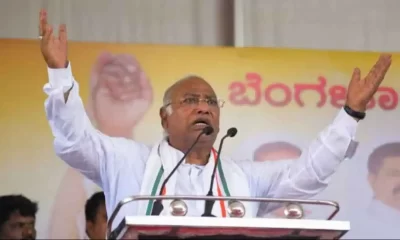
 2024 Lok Sabha Elections17 hours ago
2024 Lok Sabha Elections17 hours agoMallikarjun Kharge vows to continue politics till his last breath to defeat BJP
-

 2024 Lok Sabha Elections24 hours ago
2024 Lok Sabha Elections24 hours agoRahul Gandhi clarifies on wealth survey remark, says aim is to identify injustice
-

 India News23 hours ago
India News23 hours agoRamdev, Balkrishna publish bigger apology in newspapers after Supreme Court’s rap
-
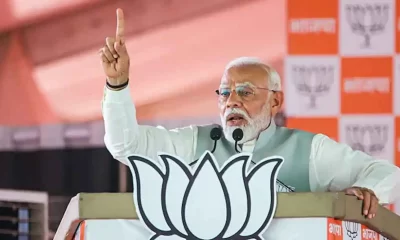
 2024 Lok Sabha Elections20 hours ago
2024 Lok Sabha Elections20 hours agoPM Narendra Modi slams Congress over Sam Pitroda’s inheritance tax remarks, accuses Congress of intending to impose higher taxes
-

 Entertainment19 hours ago
Entertainment19 hours agoMadhuri Dixit, Karisma Kapoor recreate Dil To Pagal Hai dance battle on Dance Deewane
-

 2024 Lok Sabha Elections18 hours ago
2024 Lok Sabha Elections18 hours agoNitin Gadkari says he’s better now after collapsing at election rally in Maharashtra’s Yavatmal
-

 Trending22 hours ago
Trending22 hours agoA waiter’s life: Social media users go emotional on watching viral video
-

 India News1 hour ago
India News1 hour agoTamannaah Bhatia summoned in illegal IPL streaming app case, to appear before cyber cell on April 29



